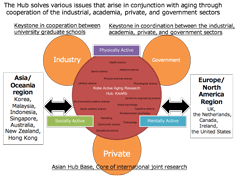The aging of the population is somewhat of a gift in terms of what humans have achieved in longevity, whilst simultaneously being one of humanity's biggest societal concerns. In Japan, the increase in the population of late-stage senior citizens prompts a similar increase in individuals who require care/support and those who have a light case of dementia, as well as single-living senior citizen households that grow in conjunction with urbanization and growth of nuclear families. Both of these elements have contributed to the growing problem of the sudden rise in nursing and medical fees. In order to tackle these issues, numerous public institutions including the government have been considering policies related to the extension of healthy life expectancy, but have not been able to indicate a sufficient course of action. Taking this into consideration, the World Health Organization (WHO)'s policy of "active aging", which was proposed in 1999, has been focused upon as a policy towards solving these issues. This policy aims to destroy fixed preconceptions of the elderly as socially disadvantaged due to being infirm and unproductive, and to regard senior citizenship as an active, assertive, and opportunity-filled stage in life. It also aims to make radical changes in awareness of aging to a process of development and maturity over an individual's life, and activate social actions for the realization of these changes. This policy by WHO is considered a decisive guiding principle for the solution of Japan's various issues pertaining to its aging population. However, the amount of information that could respond to this policy, such as academic support and research knowledge, is limited. The integration of academic fields centered on active aging is becoming more in demand.
This graduate school has succeeded in gaining academic results and making various social contributions that pertain to the development of humans and the environments surrounding them. In order to pass on, expand upon, and further deepen its tradition, the Institute of Human Development, which led these activities, is now about to establish an Active Aging Research Hub (hereinafter "the Research Hub") aiming to solve tasks related to the aging society.
The graduate school has accumulated results for fundamental active aging research from applied and practical researchers that seek a broader understanding from psychological, physical, and societal standpoints. More, specially, from fields of study such as the physiological, psychological, behavioral, social, environmental, management, and educational sciences. The Research Hub, by consolidating these numerous academic undertakings, will act as a center for creation of innovative research activities where various possibilities in active aging will be investigated and assertive social implementations will be attempted including the global propositions for support that were gained from said investigations.
More specifically, the Research Hub will be involved in 4 main activities. Firstly, the fundamental/applied/practical research activity, which covers wide-scale perspective from individual to society pertaining to active aging. Secondly, dissemination of research internationally focusing upon the Asia population, hereby contributing to a predominantly European held. Thirdly, the support activity, which connects industry with private and public sectors without limiting to universities and aids in research that cultivates a variety of human resources. Finally, the networking activity, which enriches global research networks, especially on the Asia region. These 4 activities aim to implement and develop active aging research planning, accumulate and disseminate research information, proliferate research activities, and plan/develop various activities that involve cooperation and connections between related research organizations. With this in mind, we aim for the Research Hub to conduct these main activities and become an international research base that functions as both a platform and a hub.



